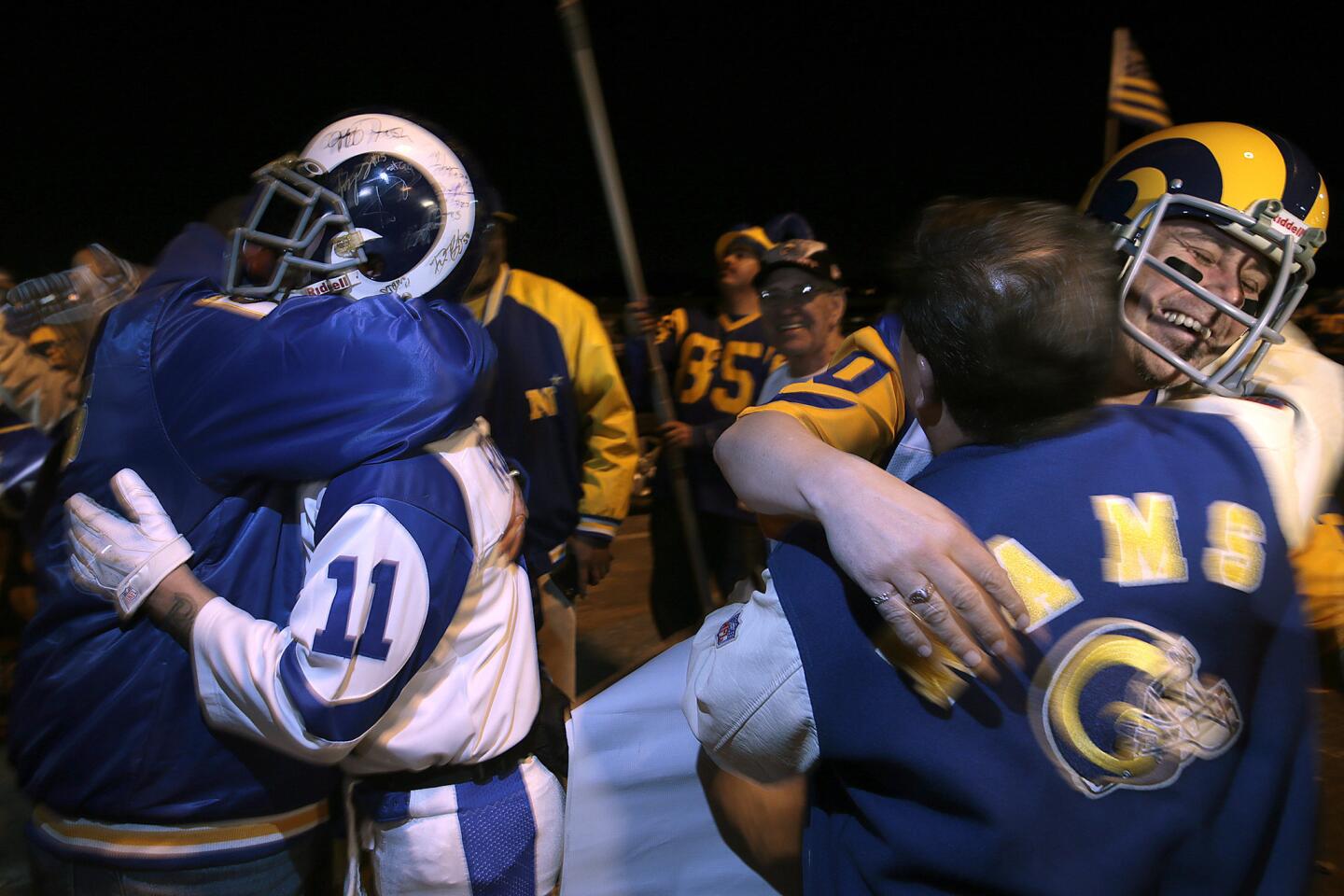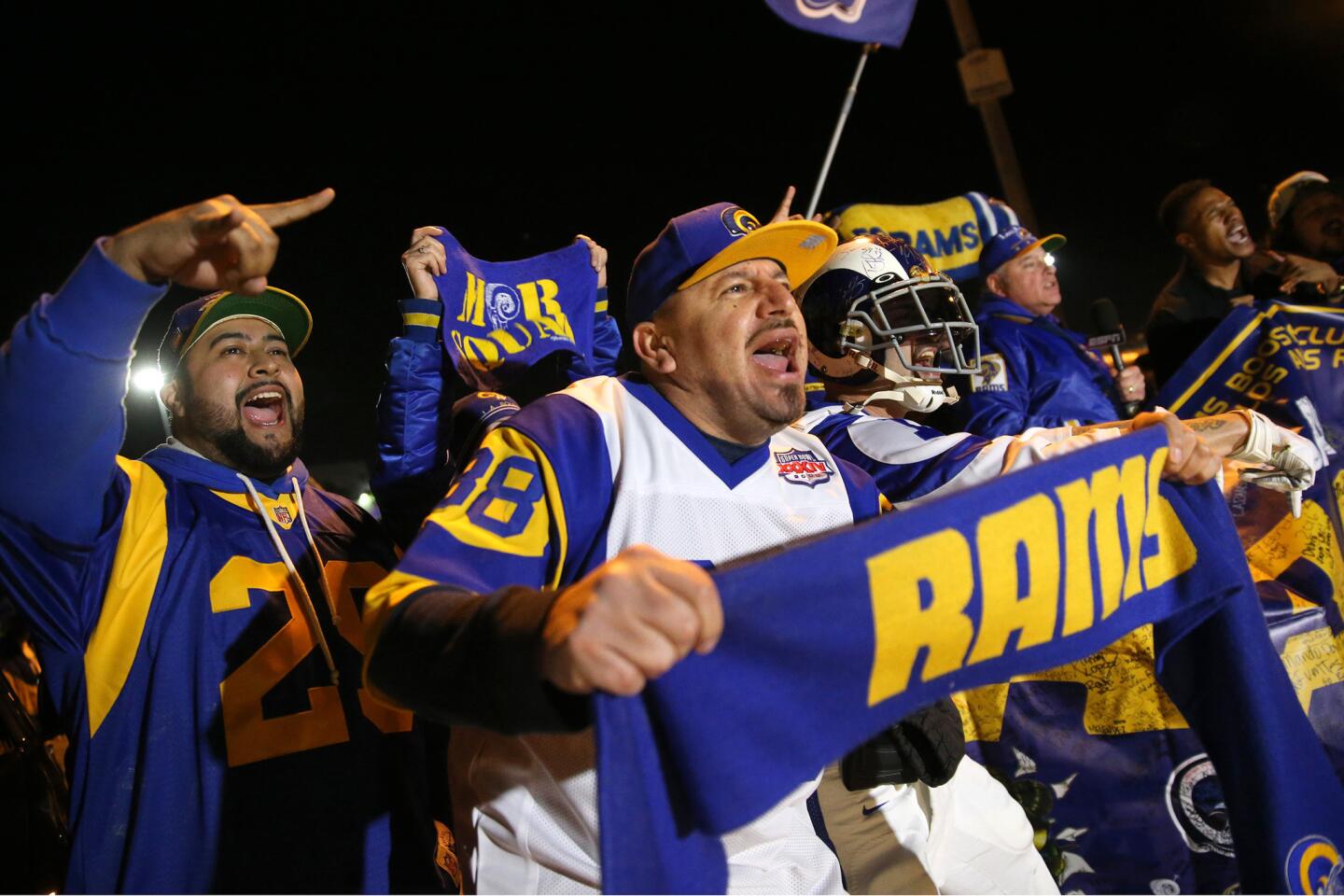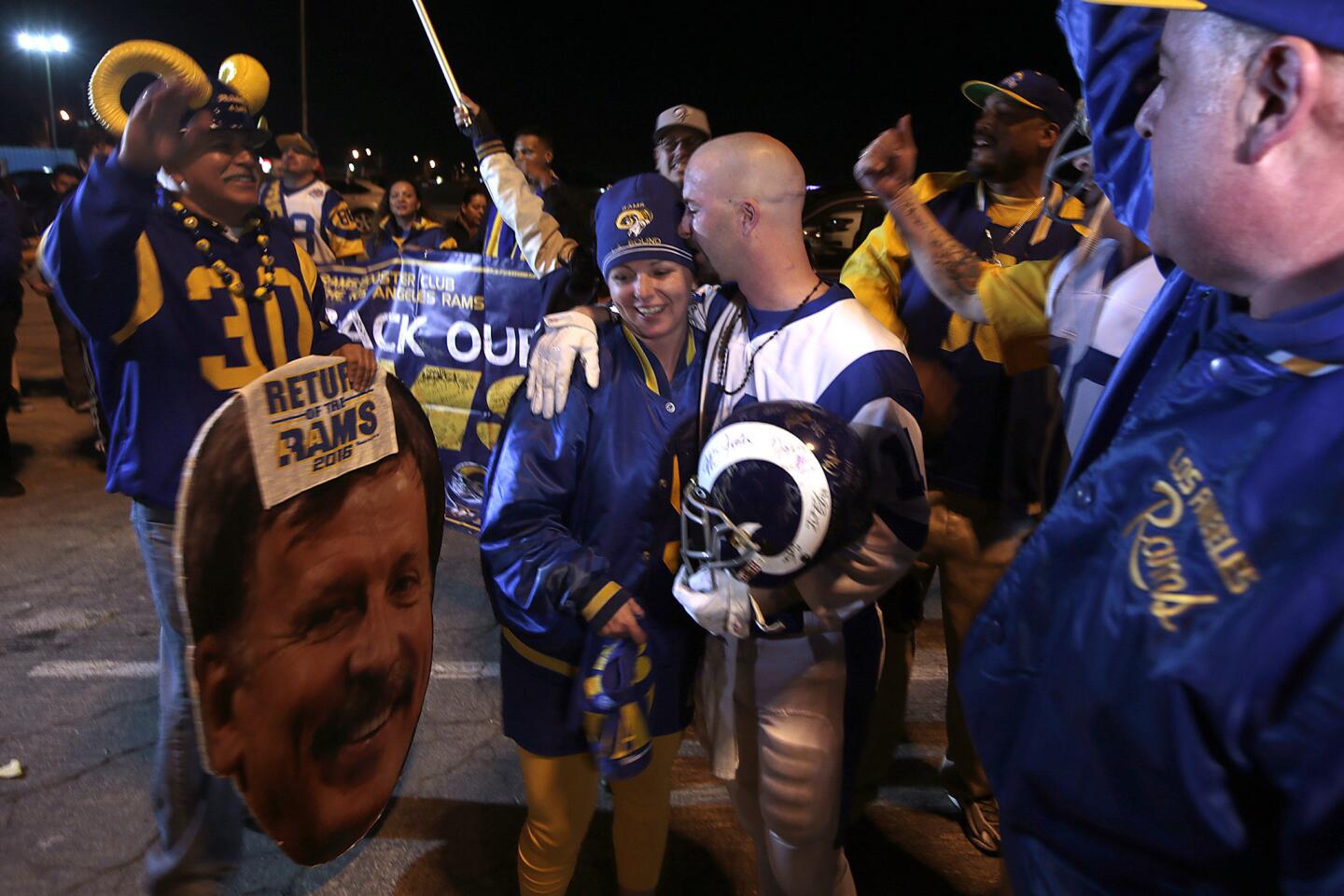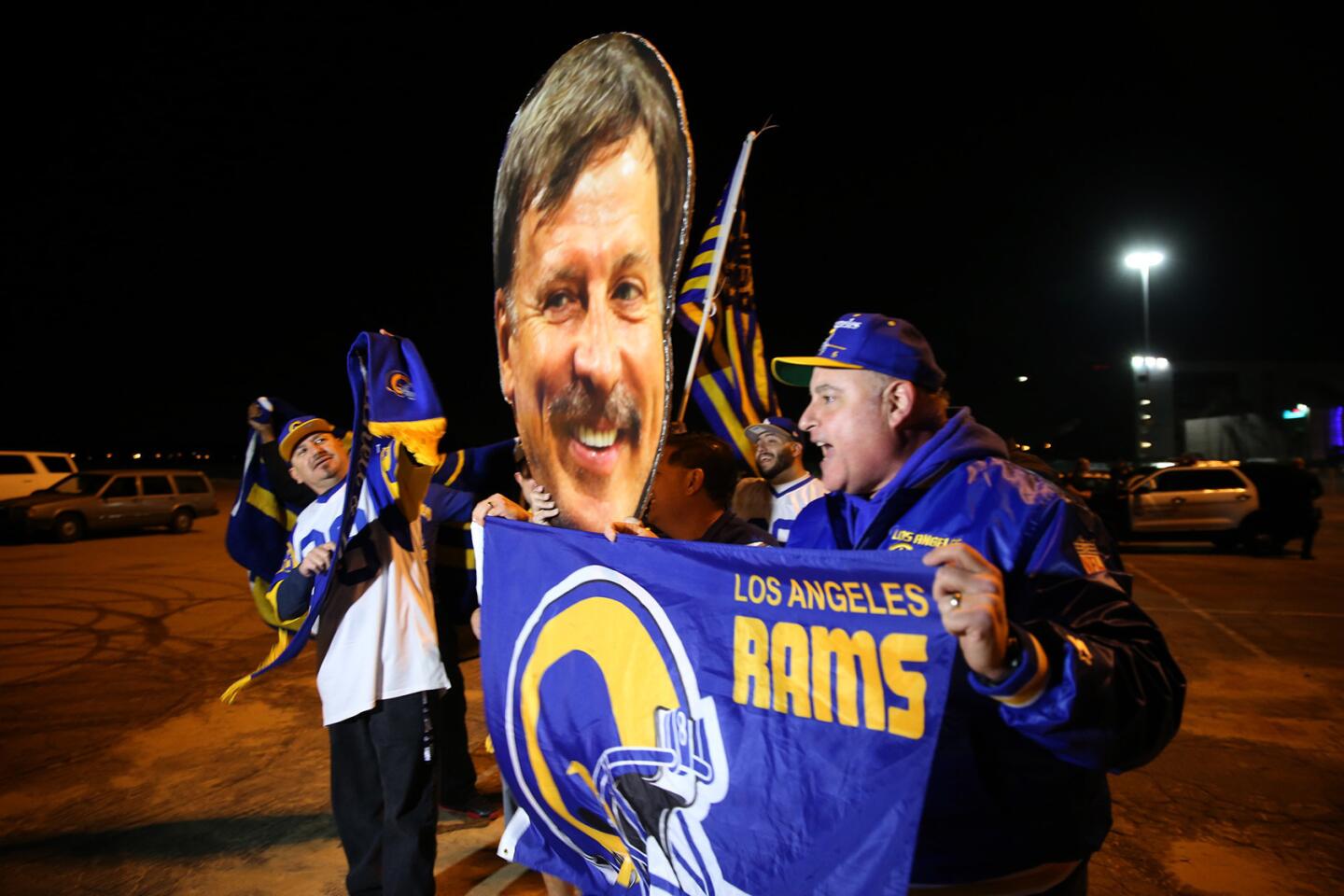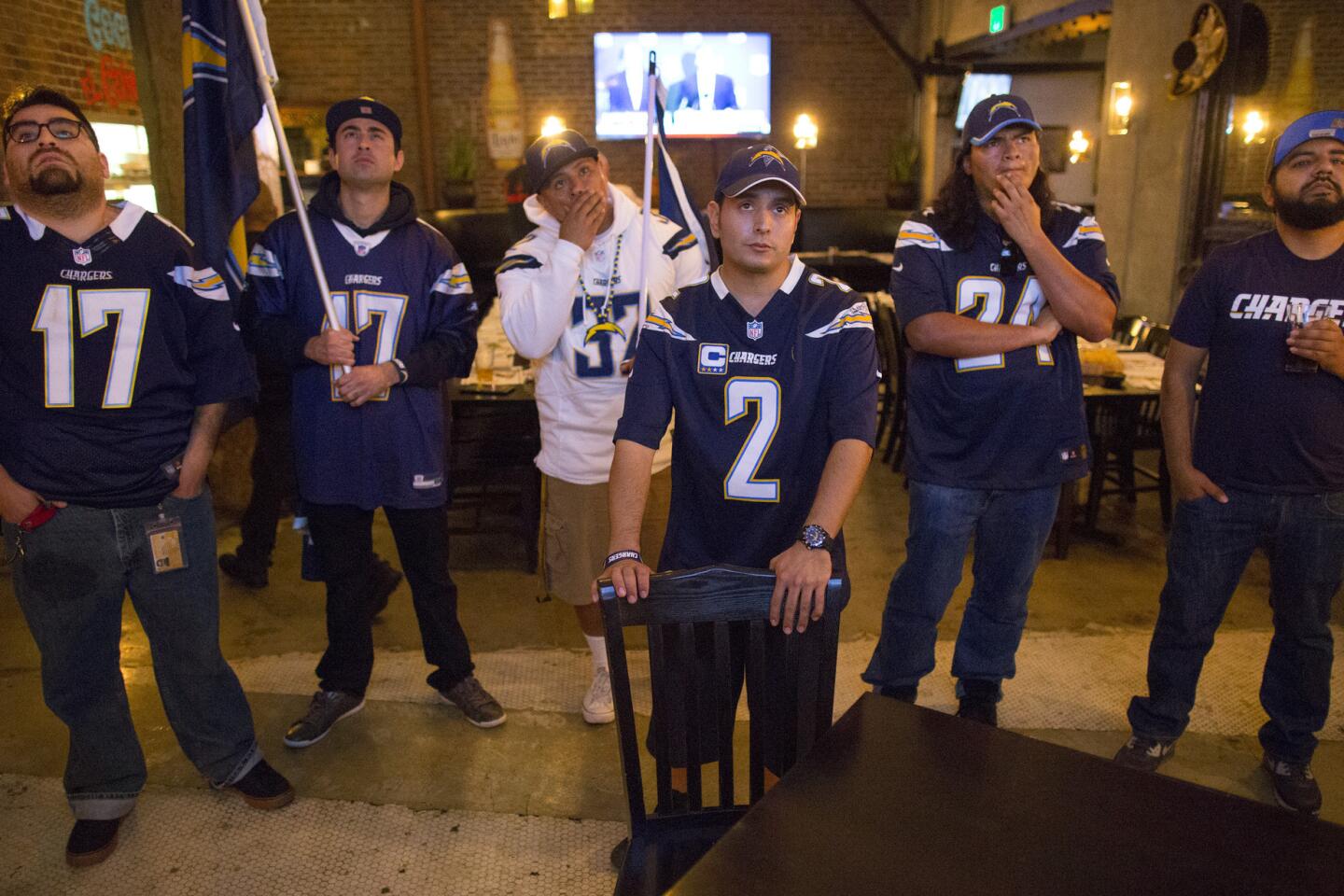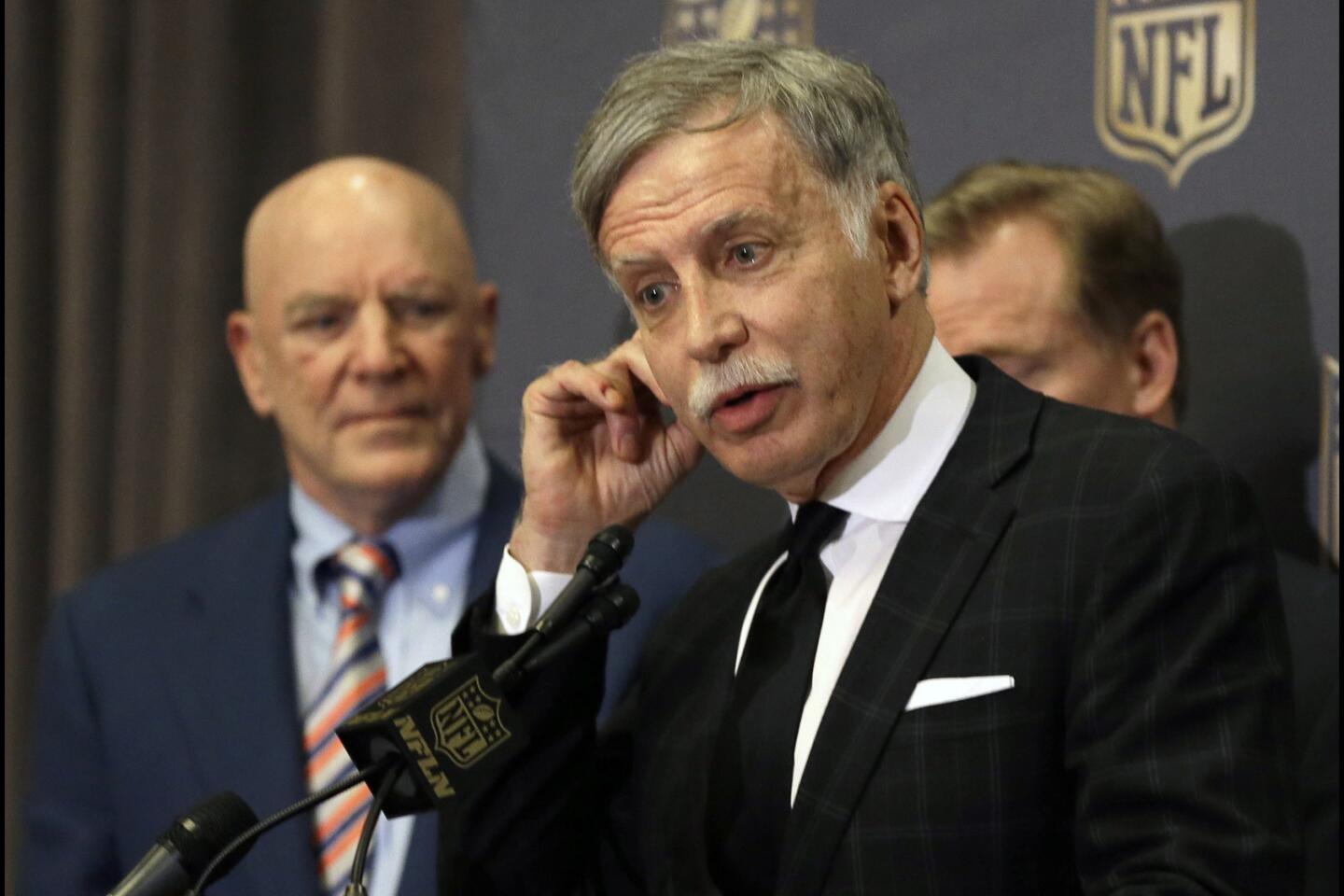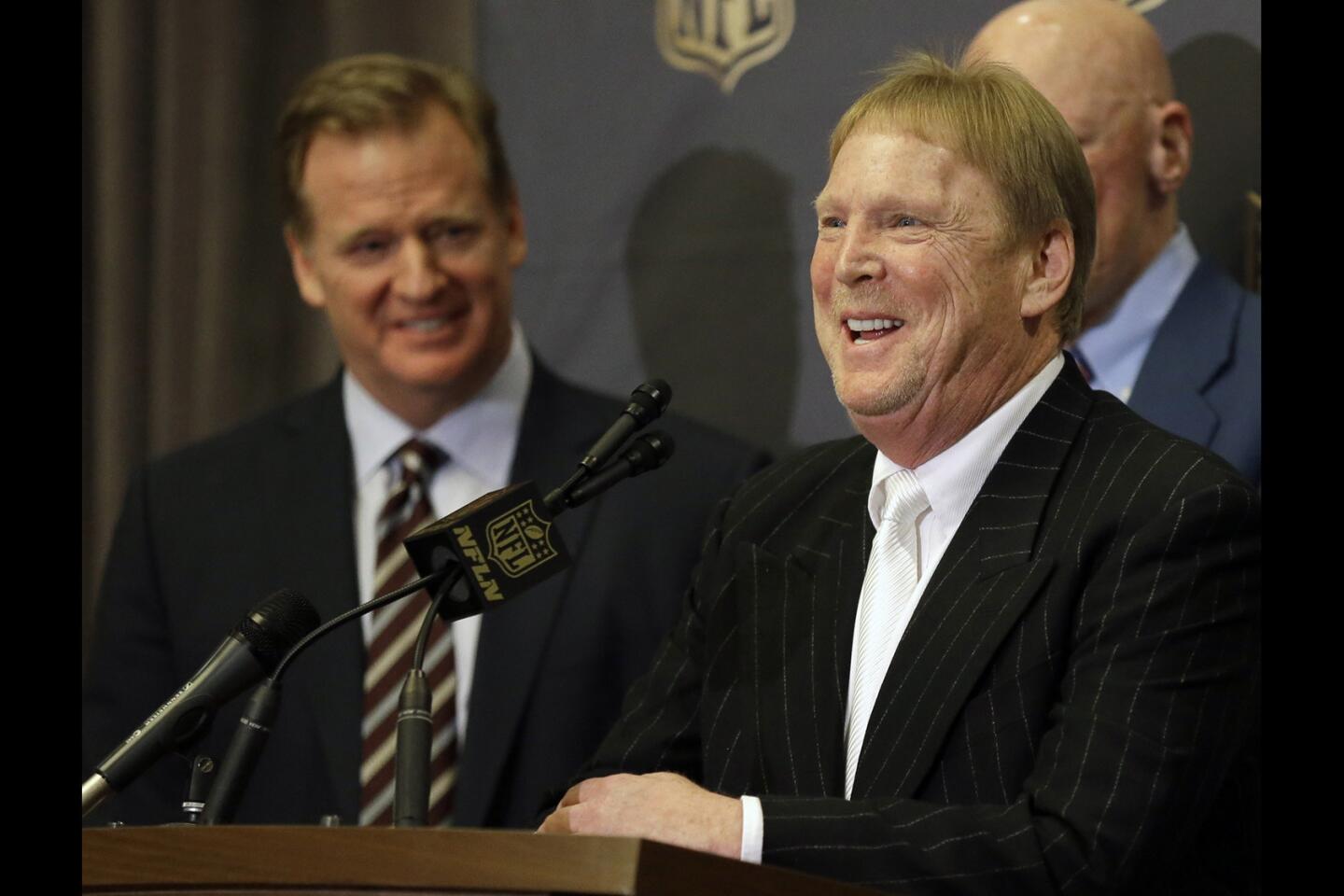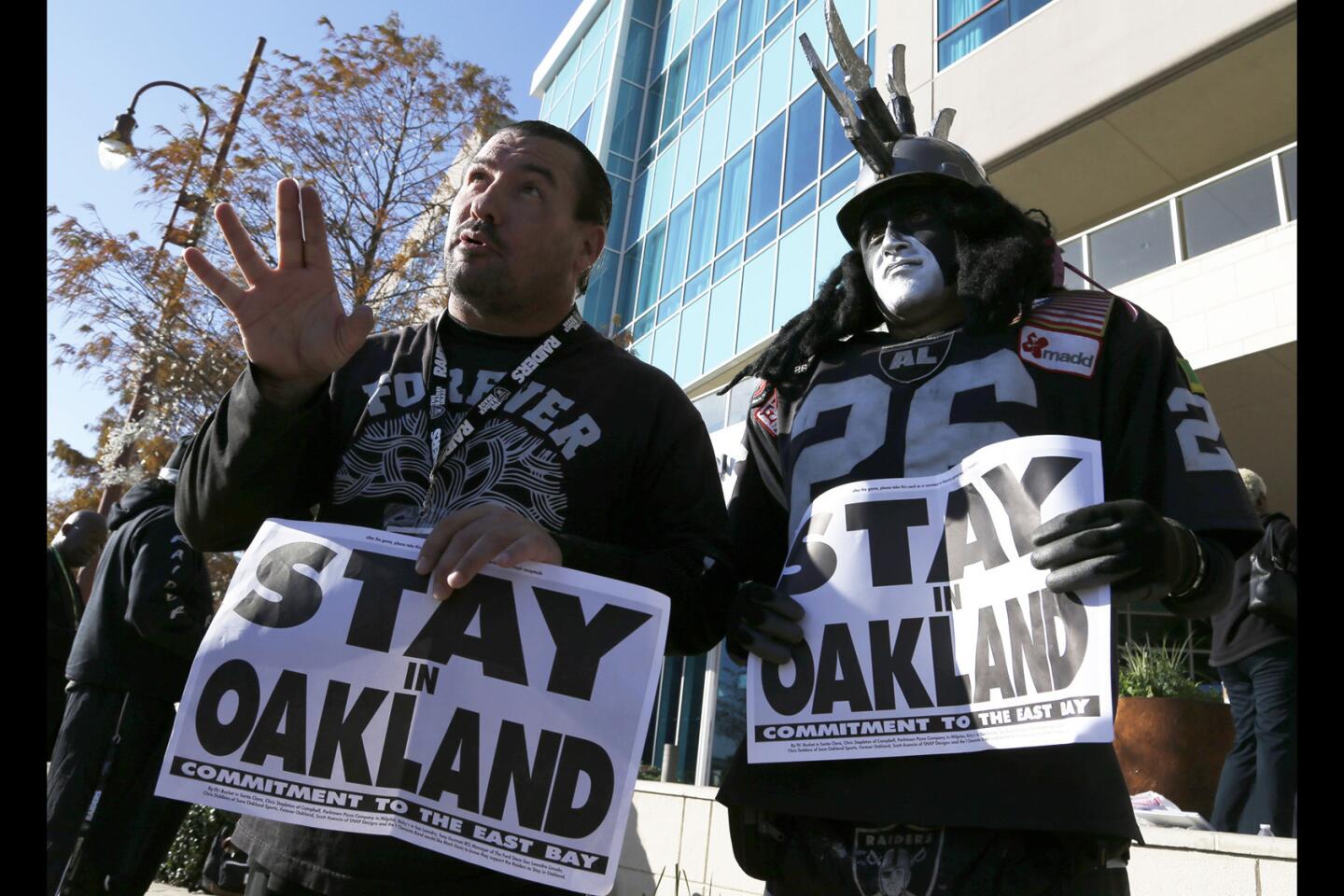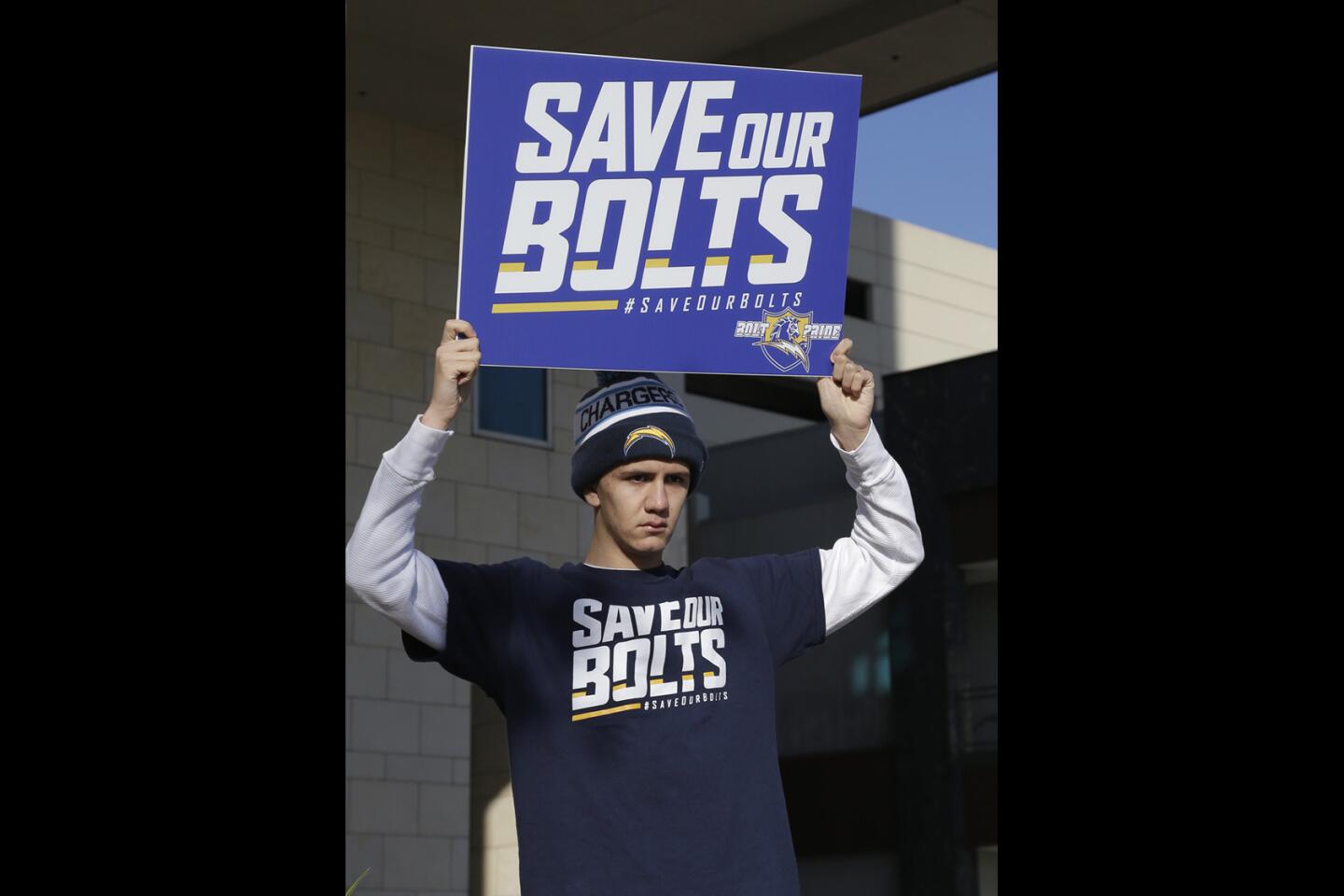L.A. fans thrilled -- mostly -- to have Rams back in town
- Share via
After 21 years of no NFL football in Los Angeles, sports fans throughout the county rejoiced Tuesday night that the region will once again be home to the Rams.
Angelenos -- some with a tear in their eye -- celebrated the news in the streets and on social media after league owners approved the Rams moving to Inglewood from St. Louis. The San Diego Chargers have a one-year option to also move to the new stadium set to open in 2019.
In Inglewood, not far from the glittering lights of the Hollywood Park Casino, Tom Bateman stood by his black Dodge Charger -- a jumbo photo of Rams owner Stan Kroenke resting against the car. Two Rams helmets sat on the hood.
“It’s surreal. It’s surreal that this is finally a reality,” Bateman said as he pointed to the future site of the stadium. “It’s all going to happen right there.”
Bateman, a member of the Bring Back The Los Angeles Rams Facebook group, said he was ecstatic when the news broke.
“It’s pretty amazing,” Bateman said, nearly in tears. “It’s a dream come true.”
The 44-year-old said he has been a Rams fan since the team left Los Angeles for Anaheim after the 1979 season. He was out of the country at the time. When he came back to California in 1996, the team had moved to St. Louis.
“When I came back home, it felt weird, I didn’t have a team here anymore,” he said.
By 8 p.m., nearly 100 other Rams fans gathered by his side to celebrate the team’s relocation.
Outside the Forum Liquor store in Inglewood, Willie Vernado nodded and smiled when he heard the Rams were coming back.
“I love it,” he said. “I live two blocks away. ... I’m hoping to get a job there.”
He added: “It’s going to do some good for Inglewood. The city will benefit more from them.”
Vernado said he wasn’t concerned about the new stadium and two potential teams adding traffic.
“There’s traffic everywhere in L.A.,” he said. “If you don’t want traffic, don’t come to L.A.”
But Los Angeles City Councilman Marqueece Harris-Dawson, who represents parts of South L.A. near Inglewood, said he was concerned about how an Inglewood stadium could affect congestion in his district.
“We’re very concerned,” Harris-Dawson said. “To get to the stadium, you’re going to have to go through our district.” That could mean heavier traffic and a parking crunch while most of the benefits of the stadium go to Inglewood, the councilman said.
“This is typically an area not used to having any traffic on a Sunday at all,” he said. “You’ve got to give that a look.”
Jeff Fellenzer, a senior lecturer at USC who teaches classes related to sports, business and the media, said that for the last several years, Los Angeles has been “missing the biggest sports party” and the “sizzle you feel in other markets,” especially around this time of year, when the NFL playoffs are in full swing.
It seems “almost incomprehensible,” he added, that the country’s second-largest media market doesn’t have a team.
“Whether [or not] you think that L.A. doesn’t care as much as other markets do about their NFL team, there should be a team in this market, and there are plenty of people who will passionately support a team in Los Angeles,” Fellenzer said. “Sports are part of a fabric of a city -- and this is the most popular sport in the country by far.”
Mayor Eric Garcetti said the move cements Los Angeles as “the epicenter of the sports world.”
“We cannot wait to welcome the Rams, and perhaps others soon, as they join a storied lineup of professional franchises, collegiate powerhouses, and sports media companies,” Garcetti said in a statement. “With the return of the NFL, there is yet another reason for visitors to come to Los Angeles, and for Angelenos to love calling this city home. I look forward to seeing the players out on the field.”
In approving the Rams’ move, NFL owners turned their backs on a proposal that would have allowed the Chargers and Raiders to move to a stadium planned in Carson.
Los Angeles City Councilman Joe Buscaino, who represents a district that stretches from Watts to the L.A. Harbor, said an Inglewood stadium would provide an economic boost to the region.
“We were pulling for Carson because Carson is practically in my council district,” Buscaino said. “But I still feel that having our beloved Rams in Los Angeles is a win not only for Inglewood, but for this entire region, which has been thirsting for a football team for decades.”
Carson Mayor Albert Robles said the city’s NFL bid “put Carson on the map.”
“In just a few short months, our city attorney’s office and the council put together one of the most complicated transactions in Southern California in decades,” Robles said in a statement Tuesday evening.
Robles said the city will now move forward with its original plan for building out its 157-acre property “with one of the nation’s largest commercial developers.”
The NFL development agreement will expire in April, freeing Carson from its commitment to the two football teams.
Andy Hogan was just 5 when the Rams left Southern California. His father and grandfather were season ticket holders -- both at the Coliseum and Anaheim Stadium. He still has photos himself in a Rams onesie as a toddler.
“My dad said we might need to go back [into the] attic to bring back some of the old stuff,” Hogan said.
Hogan, who was mostly a college football fan, said he became interested in the Rams when he saw a story about them possibly moving back to L.A. in 2009. He said he quickly learned the team’s history and started a Facebook page supporting the move, which developed a following just as quickly.
He too sees the Rams as “Los Angeles’, Orange County’s, Southern California’s team.”
“The Rams have that history,” he said. “I’ve always felt like the Rams could have been and should be the unifying force. ... Like the Bears in Chicago.”
Micah Farias is still holding out hope that the Chargers will move to the L.A. area. The 29-year-old was on a college trip to San Diego when it hit him: His hometown didn’t have an NFL team. The Downey native is part of what he calls a “skipped” generation of Angelenos who nearly missed football altogether.
Farias, co-founder and editor of the “Los Angeles Area Chargers Fans” Facebook group, said he fell in love with the Bolts after watching a classic Chargers-Raiders rivalry game.
To him, the Chargers “basically represent Southern California.” The team played in Los Angeles in 1960 before moving to San Diego in 1961.
But that’s only part of the reason Farias says they’re the best fit for L.A.:
Angelenos have watched the Chargers on local television for years -- when the games aren’t blacked out due to low attendance, and he said that anytime he drives down the 405 Freeway to a game, he passes car after car plastered with lightning bolts.
“I root for the home team,” Farias said. “They were always the home team for me.”
The Rams “are” Southern California to Tom Bateman’s twin brother, Dennis, who helps run the Bring Back the Los Angeles Rams Facebook page. Their arrival helped football grow on the West Coast, nudged along desegregation efforts and filled the Coliseum for years, he said.
The team had local players, exciting helmets and colors that looked great on television, he said.
“There are so many firsts that people don’t know about,” Bateman, 44, said. “They have 49 years of history to build on.”
When Dennis Bateman graduated from Marine boot camp in October 1989, his dad asked what he wanted to do.
“It was my first taste of freedom and I said: ‘I want to see my Rams play,’” Bateman said.
So he did. And his team beat the Atlanta Falcons to improve to 5-0 and become the only undefeated team in the league to that point in the season.
Decades later, Bateman said, he still remembers the feeling -- it was better than going to Disneyland as a child.
Staff writers Emily Alpert Reyes and David Zahniser contributed to this report.
More to Read
Sign up for Essential California
The most important California stories and recommendations in your inbox every morning.
You may occasionally receive promotional content from the Los Angeles Times.
